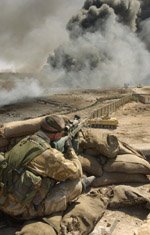
CAMP INCHON, Kuwait -- U.S. Marines going into battle in Iraq will have state-of-the-art equipment to warn them of chemical or biological attack -- but their first hint of danger may well come from a pigeon.
The distribution of dozens of the birds to Marine regiments in the Kuwaiti desert on Friday raised some laughter but also underlined how seriously the U.S. military is taking the threat of gas attack should it invade Iraq.
"They're an extra sensor," said Staff Sgt. Dan Wallace, who is responsible for all precautions against nuclear, chemical and biological attack in his regiment.
Pigeons are more sensitive to nerve and chemical agents than humans. Just as canaries once warned miners of the threat of explosive gas, the U.S. military thinks pigeons may once again prove to be the difference between life and death.
"I got sensors that cost $12,000 and birds that cost $60 each and I place just as much trust in the bird as the sensor. Anything mechanical can fail or give us wrong readings."
Each bird came with a cage and a supply of birdseed.
The marines admitted they had little idea how to care for the birds, but said they would be learning fast. "We were supposed to get chickens but they died before they got here," Wallace said.
It was not clear if the U.S. Army or the British forces would also get pigeons, which have a long history of helping people during war.
In Greek and Roman times, pigeons brought news of victory and defeat from the battle front. During World War I and World War II, they carried messages across enemy lines.
Some were even awarded medals for their exploits.
This time, their role will be different.
"The pigeons are good because a lethal dose for them will not kill us," said Chief Warrant Officer Robert Gabrych, who had placed his birds in a shady spot in this desert encampment. "Hopefully they'll give us an early warning."
The First Marine Regiment was given 40 birds. Each will get a handler, probably a lance corporal, who will care for it and give it a name. Officers predict the birds will become mascots.
The United States says Iraq's Saddam Hussein is hiding weapons of mass destruction in defiance of U.N. resolutions and has vowed to disarm him, by force if necessary. Iraq denies the charge.
A U.S.-led coalition is deploying a 270,000-strong military force for a possible attack on Iraq. Ground troops are poised to cross into Iraq from Kuwait wearing heavy protective suits and boots. They must carry a gas mask in case of chemical attack.
Most soldiers have also been inoculated against anthrax and smallpox in case Saddam finds a way to attack them with the stocks of biological agents Washington says he still possesses.
Wallace, dubbed the Pigeon Master by his fellow marines, says the birds could be useful if Iraqi forces blow up oil wells or bombs damage petrochemical facilities as fumes and heavy smoke can confuse electronic sensors, causing false alarms.
The birds could also detect toxic gases should an industrial facility or water treatment plant be hit, releasing noxious chlorine clouds.
"Sometimes the best devices are low-tech. That bird is going to tell us a lot," Wallace predicted.
Reuters by this reporter2003-03-14 12:02:00.0

